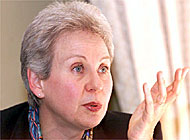
WWF: Sleeping with the enemy?

Can environmental groups achieve their goals best by confronting industry or working with it? The Swiss branch of the conservation organisation, WWF, has chosen the latter option, a decision that has been greeted with concern from some rank and file members.
This change in approach from confrontation to cooperation was the key factor in the WWF-Switzerland’s decision to recruit its new boss from big business. The person it chose was Carol Franklin, who had previously worked for 20 years at the reinsurance company, Swiss Re.
Franklin has presided over a three-stage re-organisation of the WWF, overhauling its strategy, structure and staffing. Accompanying this restructuring, the WWF has been enthusiastically pursuing its policy of working closely with companies, some of which have far from blameless environmental records.
“We work very closely with government, but big business has the leverage to make the changes we’re looking for,” Franklin told swissinfo.
“The time is over when we could simply challenge government and business. We have to offer them new possibilities. And business is interested, because they realise they won’t survive if they don’t change and do business in a more sustainable way,” she explains.
Cosier relationship with business
The WWF – formerly known as the World Wide Fund For Nature and the World Wildlife Fund – has partnerships with many well-known Swiss brands, such as the biggest supermarket chains, Migros and Coop, Swisscom’s Internet service, Bluewin, the Federal Railways and the Zurich Cantonal Bank.
This cosier relationship with business has not gone down well with everyone at WWF-Switzerland, which, Franklin says, was traditionally one of the more “fundamentalist” national branches. A number of people have decided to quit the organisation as a result of the change in policy.
“I had to leave the WWF, mainly because I felt constrained in my work, due to the fact I had to take the interests of business into account,” one former WWF employee was quoted as telling a German-language magazine.
Some former colleagues suggest that the WWF headquarters in Zurich have suppressed some reports critical of certain companies.
“Anything which would not be supported by the majority of the population is deemed radical,” complains another former employee.
“Strategic Global Partners”
The new Swiss strategy mirrors what is happening on the international stage, where the WWF’s “Strategic Global Partners” include the German technology group, AEG, the food and hygiene multinational, Unilever and the Swedish-based forestry group, AssiDomän.
The WWF says consumers know that timber from AssiDomän comes from sustainably managed forests, thanks to their joint Forest Stewardship Council. A number of the WWF’s Swiss partners, such as Migros and Coop, have agreed only to stock FCS wood products.
Similarly, WWF has created a Marine Stewardship Council with Unilever, the largest producer of frozen fish in the world. “It’s in Unilever’s interest to act now, otherwise they won’t be producing any fish fingers in 20 years’ time,” Franklin explains.
But many WWF-Switzerland workers, especially in the regional branches, say there is now an unwillingness to criticise companies, especially those that are partners of the environmentalist group. They say there is a real risk that undeserving firms will be “greenwashed” – given the environmental thumbs-up – and the public misled.
“The Cooperation instead of Confrontation slogan is based on the misconception that green NGOs prevent business doing its job,” a WWF employee, who wanted to remain anonymous, told swissinfo.
“We must deal with industry, but we must also challenge it,” he said.
Carol Franklin acknowledges the danger of greenwashing, but points out that the WWF is interested in dealing with those sections of companies where a real difference can be made.
“Unilever is a big company, and not everything it does is environmentally correct or sustainable. But we have to start somewhere. Eventually they may change their whole way of doing business,” she says.
Another example is the Swiss electricity sector. Eleven companies have been awarded the WWF’s “naturemade star” label – despite the fact that all produce nuclear power, to which the WWF is vehemently opposed.
Franklin points out that some 60 per cent of electricity in Switzerland comes from hydroelectric plants, and the WWF wants to encourage the electricity firms to make this source of energy more ecological than it is at present.
“We will work with them on renewable sources of energy. But we are clearly opposed to our partners on the question of nuclear power,” she says.
Carol Franklin fervently believes that through a policy of engagement, her organisation can persuade big business to change its ways.
“They realise that they won’t be able to survive if they don’t change their ways,” she says. “We want to make the world a better place, and gradually, governments, business and consumers want that too.”
by Roy Probert

In compliance with the JTI standards
More: SWI swissinfo.ch certified by the Journalism Trust Initiative




























You can find an overview of ongoing debates with our journalists here . Please join us!
If you want to start a conversation about a topic raised in this article or want to report factual errors, email us at english@swissinfo.ch.